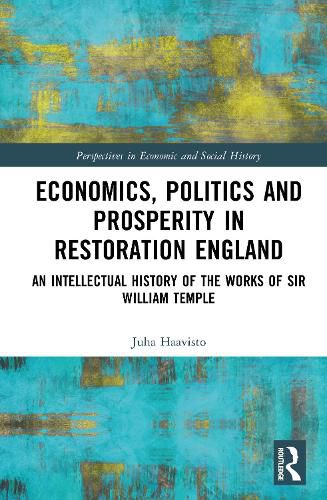Readings Newsletter
Become a Readings Member to make your shopping experience even easier.
Sign in or sign up for free!
You’re not far away from qualifying for FREE standard shipping within Australia
You’ve qualified for FREE standard shipping within Australia
The cart is loading…






Drawing on key published works, as well as those of his contemporaries, this book explores the political and economic thought of the seventeenth century diplomat William Temple and his proposals for change in Restoration England and Ireland.
Adopting a revisionist approach, the book explores Temple's efforts to balance and advance English society during a period of shifting power between England, the Netherlands, and France. Engaging with themes including mercantilism, state building, and environmental determinism, Temple connected the ideas of antiquity to those of contemporaries while influencing subsequent intellectual currents. As the book shows, Temple viewed humans as curious and greedy creatures, who would stop at nothing unless their motivations and passions could be subdued or diverted. This belief had immediate practical political and economic consequences in Temple's work: the survival and stability of the polity had to be secured, but he also advocated toleration so that members of society were afforded space to follow their motivations. Furthermore, this led Temple to argue that prosperity could be achieved not only by managing human nature but through practical action as well. He advocated for direct investment in Ireland to boost its commercial prospects, albeit for the benefit of the English crown, in a way that foreshadows current thinking on economic development.
This book will be of interest to readers in the history of economic and political thought, environmental history, intellectual history, and early modern history more broadly.
$9.00 standard shipping within Australia
FREE standard shipping within Australia for orders over $100.00
Express & International shipping calculated at checkout
Drawing on key published works, as well as those of his contemporaries, this book explores the political and economic thought of the seventeenth century diplomat William Temple and his proposals for change in Restoration England and Ireland.
Adopting a revisionist approach, the book explores Temple's efforts to balance and advance English society during a period of shifting power between England, the Netherlands, and France. Engaging with themes including mercantilism, state building, and environmental determinism, Temple connected the ideas of antiquity to those of contemporaries while influencing subsequent intellectual currents. As the book shows, Temple viewed humans as curious and greedy creatures, who would stop at nothing unless their motivations and passions could be subdued or diverted. This belief had immediate practical political and economic consequences in Temple's work: the survival and stability of the polity had to be secured, but he also advocated toleration so that members of society were afforded space to follow their motivations. Furthermore, this led Temple to argue that prosperity could be achieved not only by managing human nature but through practical action as well. He advocated for direct investment in Ireland to boost its commercial prospects, albeit for the benefit of the English crown, in a way that foreshadows current thinking on economic development.
This book will be of interest to readers in the history of economic and political thought, environmental history, intellectual history, and early modern history more broadly.